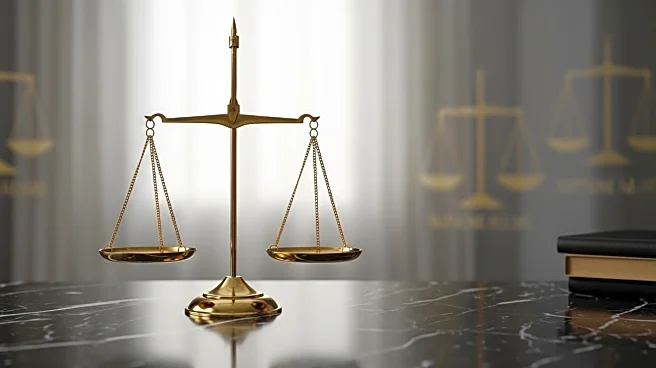What's Happening?
The Supreme Court is set to address several significant policies from President Trump's administration as it begins its new term. After a period of emergency rulings that largely avoided direct confrontations, the justices will now render final decisions on core policies, including economic tariffs and immigration measures. Among the cases is a challenge to the legality of tariffs central to Trump's economic strategy and a case concerning his authority over independent agencies. The court will also consider Trump's efforts to end birthright citizenship and deportation protections for Venezuelan migrants. These cases will test the court's stance on presidential power and could significantly impact U.S. law.
Why It's Important?
The Supreme Court's decisions on these cases will have far-reaching implications for U.S. politics and governance. The outcomes could redefine the balance of power between the executive branch and independent agencies, affecting economic and immigration policies. A ruling in favor of Trump's policies could strengthen presidential authority, while a decision against could limit executive power. The court's handling of these cases will also influence public perception of its impartiality, especially given its current conservative majority. The decisions could impact businesses, consumers, and the broader economy, depending on the rulings on tariffs and agency control.
What's Next?
As the Supreme Court hears these cases, it will need to provide detailed opinions, moving beyond the brief decisions typical of emergency rulings. The outcomes will likely provoke reactions from political leaders, businesses, and civil society groups. The court's decisions could set precedents for future executive actions and influence upcoming legislative debates. Public scrutiny will be intense, given the potential impact on key national policies and the court's role in shaping them. The term promises to be a pivotal moment for the court, with significant implications for its reputation and the legal landscape.
Beyond the Headlines
The Supreme Court's term will also address other high-profile issues, including election laws and policies affecting LGBTQ+ rights. These cases reflect ongoing cultural and political debates in the U.S. The court's decisions could influence future legislative efforts and societal norms, particularly regarding civil rights and electoral integrity. The term's outcomes may also affect the court's public approval, which is currently divided along partisan lines. The justices' rulings will be closely watched for their legal reasoning and potential impact on the court's legitimacy.








